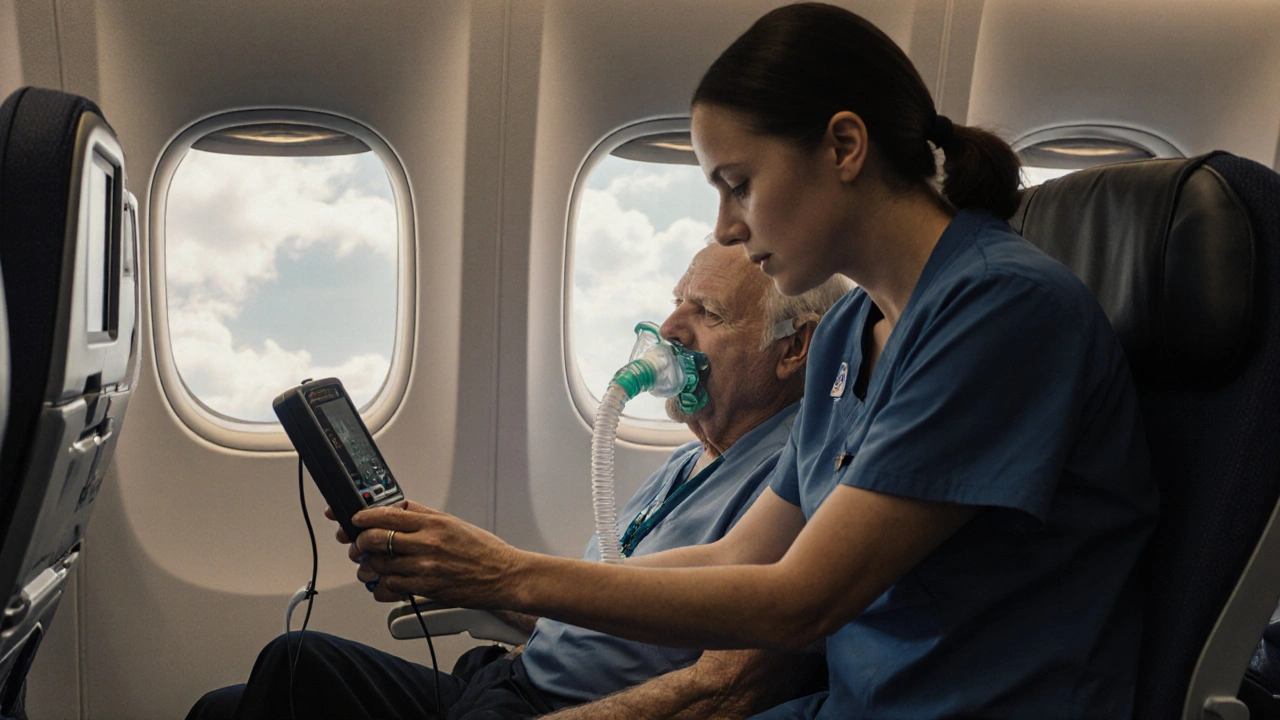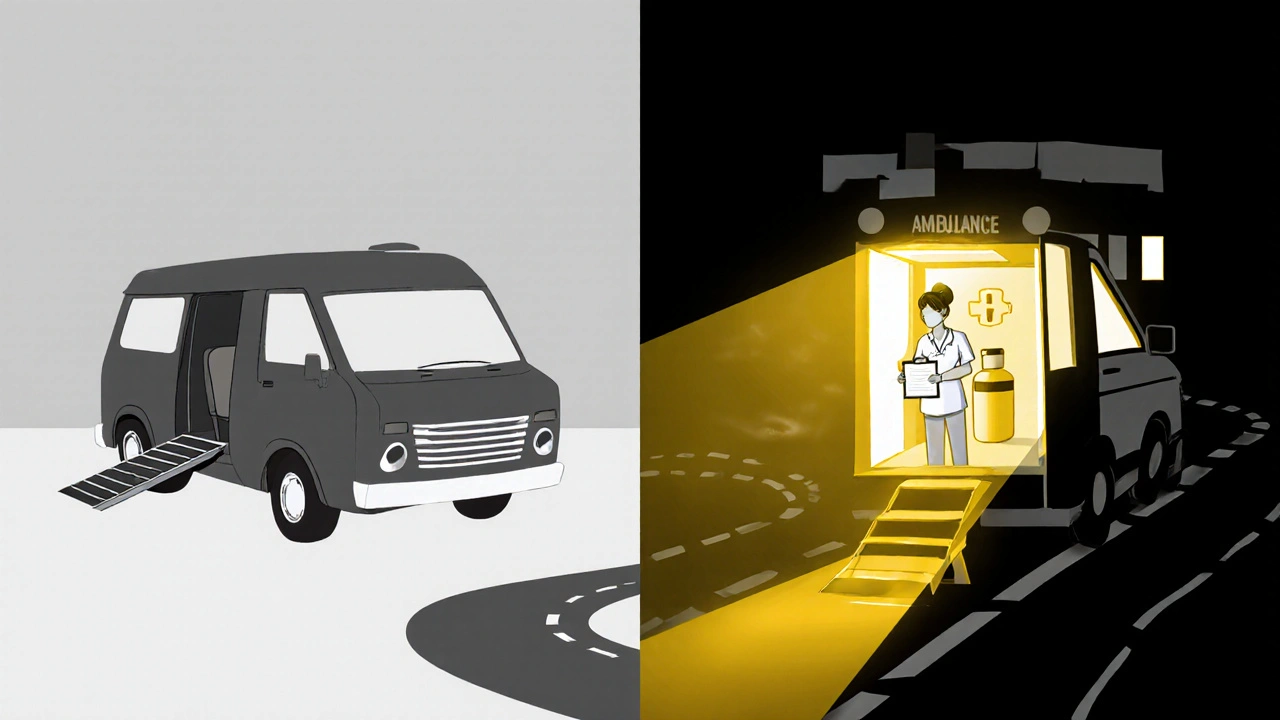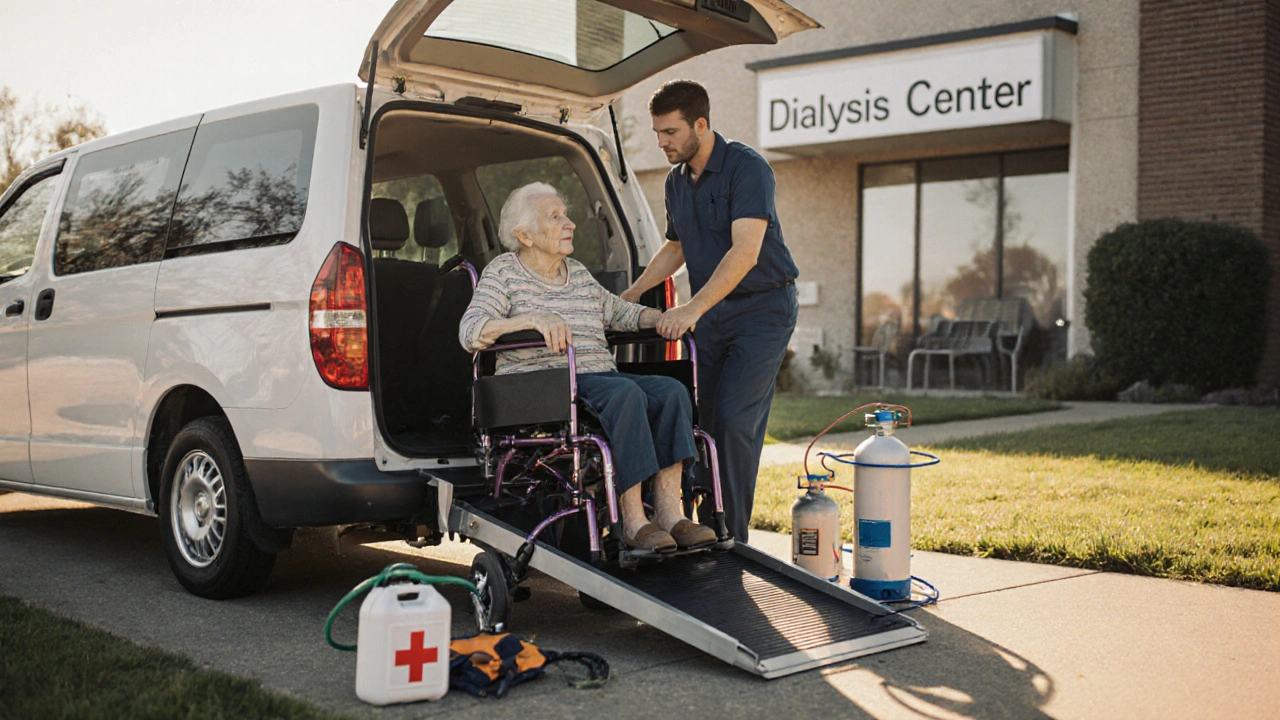Imagine you’re helping an elderly parent get to their weekly dialysis appointment. They can’t drive. The clinic is 30 minutes away. You’re not sure whether to book a regular taxi, call a medical transport service, or hire someone to accompany them. You’ve heard terms like non-emergency medical transport and medical escort services, but they sound interchangeable. They’re not. And mixing them up could cost time, safety, or even money.
What Exactly Is Non-Emergency Medical Transport?
Non-emergency medical transport (NEMT) is a structured service designed to move people who need medical care but aren’t in crisis. Think routine doctor visits, dialysis, chemotherapy, physical therapy, or follow-up appointments. These services are often covered by Medicaid, Medicare Advantage plans, or private insurance - if the patient meets specific eligibility rules.
NEMT vehicles aren’t ambulances. They’re usually vans or sedans with wheelchair lifts, ramps, or securement systems. Drivers are trained in basic patient handling, but they’re not medical staff. Their job is to get you from point A to point B safely and on time. They don’t give injections, monitor vitals, or respond to sudden health changes.
In Perth, providers like Meditrans and Accessible Transport operate under state guidelines. They schedule rides days in advance. You need a referral from your doctor or care coordinator. The service is reliable, but it’s not flexible. If your appointment gets moved, you might have to wait days for a new slot.
What Are Medical Escort Services?
Medical escort services are different. They’re not about the vehicle - they’re about the person. A medical escort is a trained healthcare professional who travels with you. This could be a registered nurse, paramedic, or certified medical transport assistant. Their role? To monitor your condition during travel, manage medications, respond to symptoms, and communicate with your care team.
These services are used when someone’s health is unstable enough to need constant supervision - but not so critical that they need an ambulance. For example: a patient recovering from surgery who needs oxygen on the plane, someone with severe dementia who wanders and needs redirection, or a person with heart failure who might need emergency meds mid-trip.
Medical escorts often travel by air, train, or private car. They don’t just drive you to the clinic - they stay with you from door to door. They might help you board a flight, sit with you during a long train ride, assist with luggage, and even coordinate with the receiving facility. It’s like having a personal nurse who travels with you.
Key Difference #1: Who’s in the Vehicle?
With NEMT, you get a driver with basic training. They know how to secure a wheelchair and follow safety protocols. That’s it. No clinical skills. No medical judgment.
With a medical escort, you get a licensed or certified healthcare provider. They can check your blood pressure, adjust oxygen levels, administer subcutaneous meds, and recognize early signs of distress. If you start having chest pain during the trip, they know what to do - and they’re authorized to act.
One is a taxi with a ramp. The other is a mobile clinic.
Key Difference #2: When Do You Need Each?
Choose non-emergency medical transport if:
- You’re stable and can sit or lie down without assistance
- You need help getting to a scheduled appointment
- Your condition won’t change during the trip
- You’re covered by insurance for this service
Choose medical escort services if:
- You’re on oxygen, IV fluids, or require frequent medication
- You have cognitive impairment and might become disoriented
- You’re traveling long distances - especially by air or across states
- You’ve had a recent hospitalization or surgery and aren’t fully recovered
- Your doctor has flagged you as high-risk for travel complications
Here’s a real example: A 78-year-old woman in Bunbury needs to fly to Perth for a specialist consult. She has COPD and uses portable oxygen. She’s confused sometimes and forgets to use her inhaler. A regular NEMT van can’t help. She needs a medical escort with oxygen equipment, a portable nebulizer, and the ability to respond if her oxygen levels drop mid-flight.

Key Difference #3: Cost and Coverage
NEMT is often covered by government programs. In Western Australia, Medicaid-equivalent schemes like the WA Health Transport Assistance Scheme may pay for rides to approved medical appointments. You usually pay nothing out of pocket - if you qualify.
Medical escort services? Almost never covered by insurance. They’re considered a private, non-medical necessity. You’re paying for a skilled professional, not just transportation. Rates vary, but expect $100-$250 per hour, depending on qualifications and distance. A cross-country trip with a nurse escort could cost $1,500-$4,000.
Some families pay out of pocket because the alternative is risky. Others use private health insurance riders, long-term care policies, or veterans’ benefits - but you have to ask upfront. Don’t assume it’s covered.
Key Difference #4: Flexibility and Timing
NEMT requires advance booking - often 24 to 72 hours. You get a scheduled window, not an exact time. Delays happen. If your appointment is at 10 a.m., you might arrive at 10:45. That’s normal.
Medical escort services are more flexible. You can book same-day if needed. The escort adjusts to your schedule. If you’re feeling unwell and need to reschedule, they’ll work with you. They’re not bound by a fixed route or fleet schedule. They’re there for you, not the system.
What About Airport Transfers?
Many people confuse airport transfers with medical transport. An airport shuttle with a wheelchair lift? That’s NEMT. A nurse who flies with you, handles your oxygen tank, and meets you at baggage claim? That’s a medical escort.
Some airlines offer medical assistance on board - but only for emergencies. If you need oxygen, IV fluids, or continuous monitoring, you must arrange your own escort. The airline won’t do it for you. And if you don’t, you might be denied boarding.

Which One Is Right for You?
Ask yourself these three questions:
- Will my condition change during the trip? If yes, you need a medical escort.
- Do I need someone to manage my meds, oxygen, or equipment? If yes, you need a medical escort.
- Am I traveling far, or through unfamiliar systems (like airports or hospitals)? If yes, a medical escort reduces stress and risk.
If you answered no to all three, NEMT is probably enough.
But if you’re unsure? Talk to your doctor or care coordinator. They can help you decide based on your medical history. Don’t guess. The wrong choice could mean a trip to the ER - or worse.
Where to Find These Services in Perth
For NEMT, contact your local Area Health Service or visit the WA Department of Health website. They have a list of approved providers.
For medical escort services, search for private companies like MedFlight Australia, CareFlight Transport, or regional nursing agencies. Ask if their staff are registered nurses or certified medical transport professionals. Check references. Read reviews. This isn’t a service you want to skimp on.
Some aged care facilities also offer escort services as part of their transition programs. Ask your care team.
Final Thought: It’s Not About the Car - It’s About the Care
Both services exist to help people get where they need to go. But one is logistics. The other is care.
Choosing the right one isn’t just about budget. It’s about safety, dignity, and peace of mind. If someone you love has a fragile health condition, don’t settle for the cheaper option if they need more. A nurse who knows your meds, your history, and your fears is worth every dollar.
Is non-emergency medical transport covered by Medicare?
Medicare in Australia doesn’t cover NEMT directly. But if you’re on a state-based assistance program like WA’s Transport Assistance Scheme, you may qualify for free or low-cost rides to approved medical appointments. Private health insurance rarely covers it. Always check with your local health department or care coordinator.
Can I use a medical escort for international travel?
Yes. Many medical escort services specialize in international travel, including flights to Asia, Europe, or North America. They coordinate with airlines, arrange medical clearances, carry portable oxygen or IV equipment, and liaise with overseas medical teams. Costs are higher - often $3,000-$8,000 for long-haul trips - but it’s the safest way for high-risk patients to travel.
Do medical escorts provide nursing care during the trip?
Yes. Medical escorts are trained healthcare professionals - usually registered nurses, paramedics, or certified medical transport assistants. They can administer medications, monitor vital signs, manage oxygen therapy, respond to symptoms like dizziness or shortness of breath, and document changes in condition. They’re not just companions - they’re clinical support.
How far in advance should I book a medical escort?
For local trips, 24-48 hours is usually enough. For air travel or long-distance journeys, book at least 7-14 days ahead. Medical escorts need time to coordinate equipment, get medical clearances, and plan routes. Same-day bookings are possible but limited and often cost more.
Can I use a family member instead of a medical escort?
You can, but it’s risky. Family members aren’t trained to handle medical emergencies. If your loved one has a sudden drop in blood pressure, goes into respiratory distress, or needs an injection, you might not know what to do. A medical escort has the skills, equipment, and authority to act. Relying on family can delay care and increase danger.
